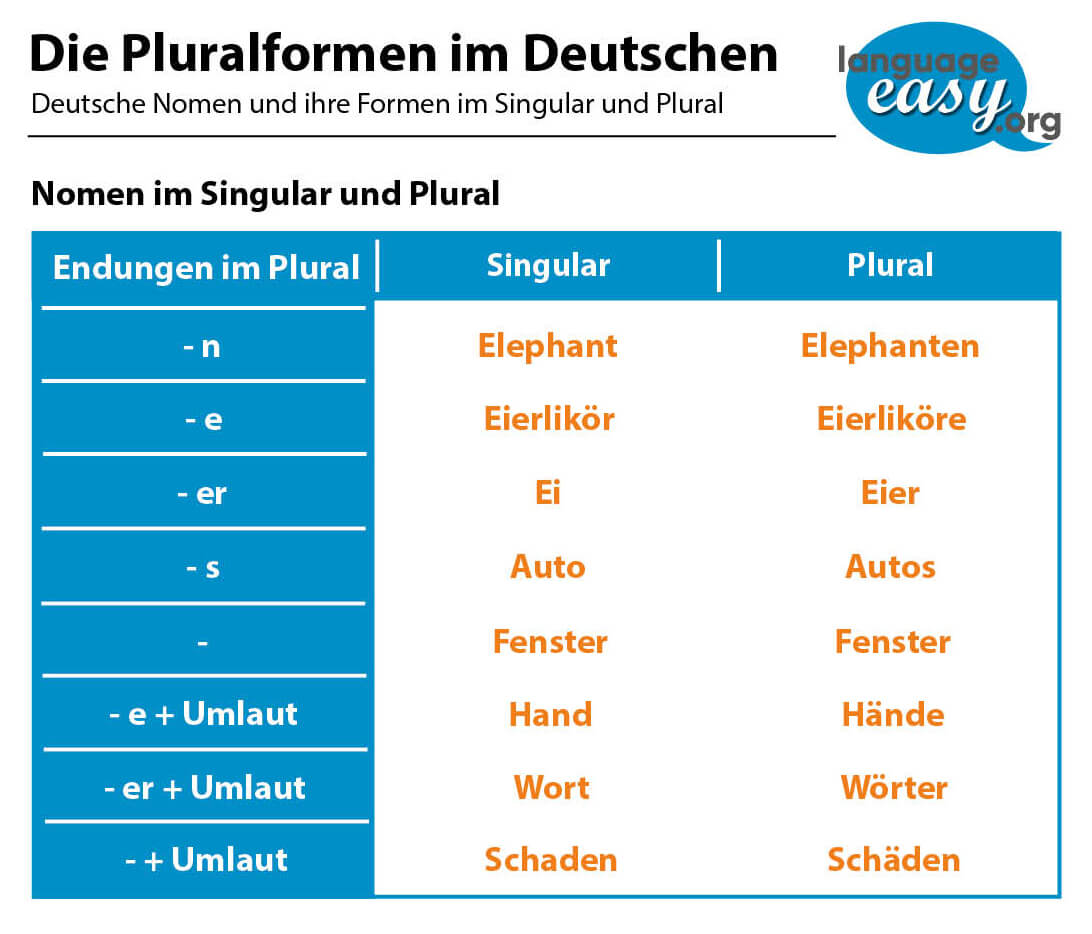German Plurals
Der Plural im Deutschen – Erklärungen und Beispiele
German Plurals – Summary
Zusammenfassung
Nouns in their plural forms in German can have the endings “-n/-en”, “-e”, “-r/-er”, “-s”. It is also possible that they don’t have any specific ending. In the following you will see some rules that can indicate the correct ending of a noun. But you have to be conscious about the fact that there are a lot of exceptions. So, always try to learn the singular and the plural form of the noun. There are five different types of plural endings:
1. “-e“:
- Masculine nouns with the endings “-eur, -ich, -ier, -ig, -ling, -ör“.
“der Tag – die Tage, der Stein – die Steine, …” - Many nouns that have one syllable and are feminine.
“der Stab – die Stäbe, der Turm – die Türme, …”
2. “-er“:
- Many neuter nouns with one syllable.
“das Tal – die Täler, das Bild – die Bilder, …” - Important: Feminine nouns never have the endings “-r/-er“.
3. “-n/-en“:
- Masculine nouns with the endings “-e, -ent, -and, -ant, -ist, -or”
“der Student – die Studenten” - Feminine nouns with the endings “-e, -in, -ion, -ik, -heit, -keit, -schaft, -tät, -ung”
“die Nation – die Nationen” - Words without German origin with the endings “-ma, -um, -us” have their endings normally replaced by “-en” in the plural
“das Thema – die Themen”
4. “-s“:
- Masculine, feminine and neuter nouns with the endings “-a, -i, -o, -u, -y“.
“der Opa – die Opas, das Auto – die Autos, die Mutti – die Muttis, das Hobby – die Hobbys” - Family names
“die Kochs”
5. No plural endings
- Masculine nouns which end in “-el, -en, -er”
“der Löffel – die Löffel” - Neuter nouns with the endings “-chen, -lein”
“das Mädchen – die Mädchen”
How sad would a world be, where only the singular existed! Well, we could actually doubt that this might even be possible. So, also the German language has its plural forms of nouns. In this article, we’d like to explain to you every single rule about German plural you should know.
So, in the following, we will analyze the different rules for forming the German plurals. Furthermore, we will take a look at words that are in the plural form but have no plural ending. By the way, in case you’d like to have some extra information about German plurals, just take a look at this article on Wikipedia.
Well, let’s not lose too much time and come straight to the rules of German plurals. Auf geht’s!
Noun Endings of German Plurals
Wortendungen des Plurals im Deutschen
First of all, we will clear up how to construct German plurals. Actually, it’s quite simple! You simply have to add the endings “-n/-en, -e, -e/-er, -s” to your noun in the singular form.
But, there are also nouns in German which have the same form for their singular and plural. Well, an example would be “Schüler” (student/s): Here, “der Schüler” is the singular form, whereas “die Schüler” is one of the German plurals. So, you can see that their ending is the same, only the article changes.
Finally, there are German nouns that are only used in the singular or in the plural. So, good examples for these types of nouns would be “das Gold” (the gold – singular) or “die Kosten” (the costs – plural).
Apart from these examples, you can see that the noun endings indicate which ending of German plurals has to be used. So, in the following, we’d like to present to you the endings of German plurals in detail.
The “-n/-en” Endings
So, let’s start with this list about German noun endings which form the German plurals with “-n” or “-en”.
- First, there are masculine nouns with the endings “-ant, -e, -ent, -ist, -or”
“der Elefant” – “die Elefanten” - Second, there are the female nouns with the endings “-e, -in, -ion, -ik, -heit, -keit, -schaf, -tät, -ung”
“die Fluktuation” – “die Fluktuationen”
Important: In the case of feminine nouns with the endings “-n”, this consonant is doubled.
“Kolegin” – “Koleginnen” - Third, the endings of German plurals “-ma, -um, -us” in foreign words are usually replaced by “-en“.
“das Thema” – “die Themen”
The “-e” Endings of German Plurals
Now, we will continue with a list of German noun endings with forms of German plurals with “-e”.
- Masculine nouns with the endings “-eur, -ich, -ier, -ig, -ling, -ör”
“der Eierlikör” – “die Eierliköre” - A lot of single-syllable feminine nouns
“die Hand” – “die Hände”
The “-r/-er” Endings
In the following, you will see a list of German noun endings that form the plurals with “-r” or “-er“.
- Many single-syllable neuter nouns.
“das Wort” – “die Wörter” - Important: Feminine nouns never form the plural with “-r/-er“
The “-s” Endings
Finally, here is a list of German nouns that have endings with “-s” forming their German plurals.
- Masculine, feminine and neuter nouns ending in “-a, -t, -o, -u, -y“.
“das Mofa” – “die Mofas”, “das Auto” – “die Autos”, “die Mutti” – “die Muttis”, “das Hobby” – “die Hobbys” - Family names
“Koch” – “die Kochs”
No Plural Endings
So, here is a list of German noun endings that don’t change in the plural.
- Masculine nouns with the endings “-el, -en, -er”
“der Löffel” – “die Löffel” - Neuter nouns with the endings “-chen, -lein”
“das Fräulein” – “die Fräulein”
Singular or Plural?
Well, as already mentioned (as you might have noticed), most nouns can be used in the singular and in the plural. But there are also two groups of nouns that are mostly used in their singular or their plural forms only.
- Nouns mainly used in their singular forms:
“das Fleisch”, “das Gemüse”, “das Obst” - German nouns mainly used in the plural
“die Ferien”, “die Kaufleute”, “die Landsleute”
Excercises
Übungen
Finally, we have reached the last part of this article where you can prove the German skills you have just learned. In the following, you will see some phrases that you should complete with the correct terms. Once you have filled all the gaps, just click on the “correct” button and you can see your errors and the correct results. Good luck and… auf Wiedersehen!



